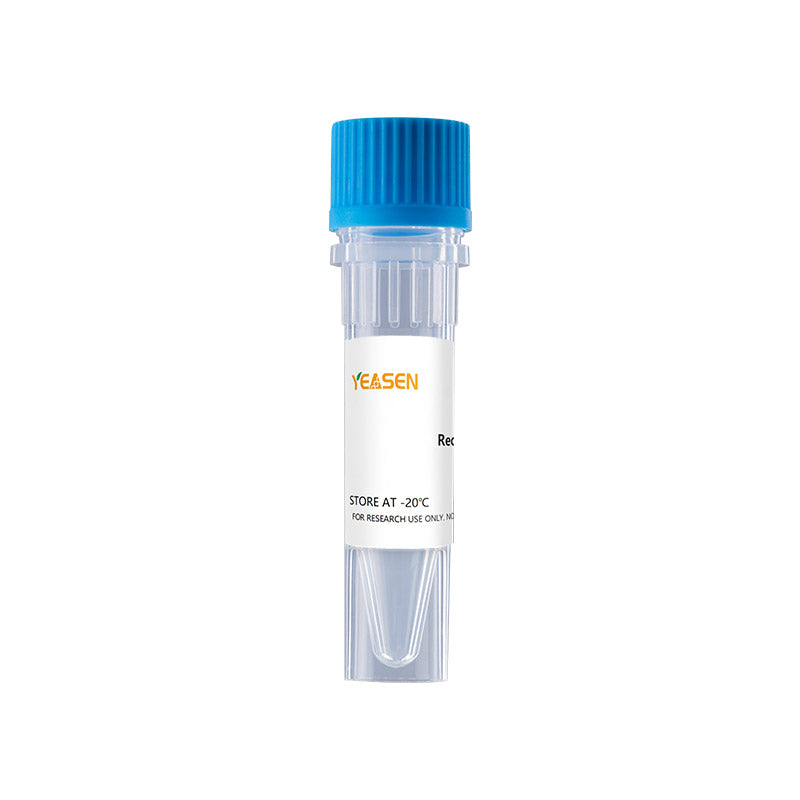Description
BMP-3, also known as osteogenin, the most abundant BMP in adult bone, is one of at least 15 structurally and functionally related BMPs, which are members of the TGF-beta superfamily. BMPs were originally identified as protein regulators of cartilage and bone formation. They have since been shown to be involved in embryogenesis and morphogenesis of various tissues and organs. BMPs also regulate the growth, differentiation, chemotaxis, and apoptosis of various cell types. Similar to most other TGF-beta family proteins, BMPs are highly conserved across animal species. At the amino acid sequence level, mature human and rat BMP-3 are 98% identical. BMP-3 is synthesized as a large precursor protein that is cleaved at the dibasic cleavage site (RXXR) to release the carboxy-terminal domain. Biologically active BMP-3 is a disulfide-linked homodimer of the carboxy-terminal 110 amino acid residues that contains the characteristic seven conserved cysteine residues involved in the formation of the cysteine knot and the single interchain disulfide bond. The role of BMP-3 in bone is contradictory since, unlike osteogenin purified from bone, recombinant BMP-3 has not shown osteogenic function.
Product Properties
|
Synonyms |
ARAP, Midgestation and Kidney Protein, Neurite Outgrowth-promoting Factor 2, Neurite Outgrowth-promoting Protein |
|
Accession |
P12645.1 |
|
GeneID |
651 |
|
Source |
E.coli-derived Human BMP-3, Gln363-Arg472. |
|
Molecular Weight |
Approximately 24.8 kDa. |
|
AA Sequence |
QWIEPRNCAR RYLKVDFADI GWSEWIISPK SFDAYYCSGA CQFPMPKSLK PSNHATIQSI VRAVGVVPGI PEPCCVPEKM SSLSILFFDE NKNVVLKVYP NMTVESCACR |
|
Tag |
None |
|
Physical Appearance |
Sterile Filtered White lyophilized (freeze-dried) powder. |
|
Purity |
> 95% by SDS-PAGE and HPLC analyses. |
|
Biological Activity |
The ED50 as determined by its ability to inhibit BMP-2-induced activity in murine MC3T3‑E1 cells. Fully biologically active when compared to standard. |
|
Endotoxin |
< 1.0 EU per 1μg of the protein by the LAL method. |
|
Formulation |
Lyophilized from a 0.2 µm filtered concentrated solution in 30% Acetonitrile and 0.1% TFA. |
|
Reconstitution |
We recommend that this vial be briefly centrifuged prior to opening to bring the contents to the bottom. Reconstitute in 4 mM HCl to a concentration of 0.1-1.0 mg/mL. Stock solutions should be apportioned into working aliquots and stored at ≤ -20℃. Further dilutions should be made in appropriate buffered solutions. |
Shipping and Storage
The products are shipped with ice pack and can be stored at -20℃ to -80℃ for 1 year.
Recommend to aliquot the protein into smaller quantities when first used and avoid repeated freeze-thaw cycles.
Cautions
1. Avoid repeated freeze-thaw cycles.
2. For your safety and health, please wear lab coats and disposable gloves for operation.
3. For research use only!
Payment & Security
Your payment information is processed securely. We do not store credit card details nor have access to your credit card information.
Inquiry
You may also like
FAQ
The product is for research purposes only and is not intended for therapeutic or diagnostic use in humans or animals. Products and content are protected by patents, trademarks, and copyrights owned by Yeasen Biotechnology. Trademark symbols indicate the country of origin, not necessarily registration in all regions.
Certain applications may require additional third-party intellectual property rights.
Yeasen is dedicated to ethical science, believing our research should address critical questions while ensuring safety and ethical standards.

